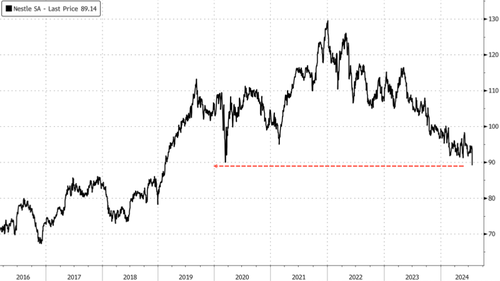
Nestle’s Guidance Downgrade Adds To Rough Start For Consumer Earnings Season
Just over a month ago, Goldman advised clients to begin shorting stocks with exposure to middle-income consumers. This came just a month after analysts targeted stocks exposed to low-income consumers.
On Thursday, Goldman analyst Natasha de la Grense told clients, „Not a great start to earnings season in Consumer, with very few positive surprises so far. Both high-end consumption and the low-income consumer are weak.”
At this rate, it’s only a matter of time before Goldman analysts tell clients to start shorting stocks exposed to high-income consumers.
The latest consumer warning comes from the world’s biggest food company as cash-strapped customers switched to cheaper generic brands amid elevated inflation and high interest rates.

Nestle reported that organic revenue in the first half of the year fell short of Wall Street’s expectations. It also revised its full-year outlook lower.
Here’s a snapshot of first-half results (courtesy of Bloomberg):
-
Organic revenue +2.1%, estimate +2.52%
-
Nespresso organic revenue +1.8%, estimate +2.67%
-
Nestle Health Science organic revenue +0.1%, estimate +0.23%
-
Other businesses organic revenue +9.7%, estimate +5.28%
-
Europe organic revenue +4.5%, estimate +4.26%
-
North America organic revenue -0.1%, estimate +0.13%
-
Latin America organic revenue +2.7%, estimate +4.03%
-
Asia, Oceania & Africa organic revenue +3.5%, estimate +3.93%
-
Greater China organic revenue +1.6%, estimate +3.51%
-
Pricing +2%, estimate +2.92%
-
Real internal growth +0.1%, estimate -0.48%
-
Underlying trading operating profit CHF7.84 billion, -0.8% y/y, estimate CHF7.77 billion
-
Underlying trading operating profit margin 17.4%, estimate 17.2%
-
Sales CHF45.05 billion, -2.7% y/y, estimate CHF45.26 billion
Full-year forecast:
- Sees organic revenue at least +3%, saw about +4%, estimate +3.83% (Bloomberg Consensus)
Jefferies analysts told clients that the guidance reduction is a major concern about the company’s profits and the strength of its brands in this challenging consumer environment.
Bloomberg pointed out, „A cost-of-living crisis has taken its toll on consumers who’ve traded down to supermarket brands, and consumer giants.”
Goldman analyst De La Grense told clients:
„The main thing I’m hearing this morning is incremental concern on Nestle’s forecasting ability. There was a time when this was the most predictable EPS story in consumer. After the CEO recently reiterated 4% organic sales growth guidance (back in May), investors are surprised to see a cut to outlook. This follows multiple quarters in the last year or so where Nestle has disappointed on top line and overshadows the fact that RIG returned to growth in Q2. Pricing is weakening and drove another miss on Q2 organic sales growth, alongside the FY guidance cut.”
Here’s what other analysts are saying (courtesy of Bloomberg):
Bryan Garnier (neutral)
- This was another set of disappointing results from Nestle, analyst Philippine Adam says
- While there was „some undeniable margin improvement,” Adam says Nestle is „struggling to restore growth momentum in some key areas and has decreased its full-year guidance from 4% to at least 3% organic growth”
Jefferies (underperform)
- Analyst David Hayes says the reduction to FY sales and EPS guidance and the 2Q organic growth miss will all weigh on stock Thursday
- Sees consensus sales growth expectations cut by up to 0.5pp
- Notes China’s soft demand and negative pricing in North America
Shares in Europe plunge to levels not seen since early 2019.

It’s troubling when the world’s largest food company struggles, indicating that consumers across various income brackets are cutting back on spending. The big question is whether Goldman will soon tell clients to start shorting stocks exposed to higher-income consumers.
Tyler Durden
Thu, 07/25/2024 – 12:30

 1 rok temu
1 rok temu















